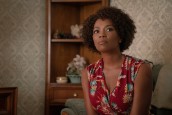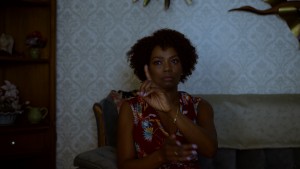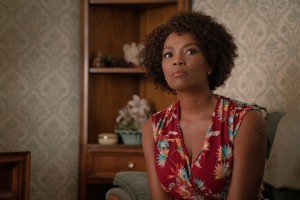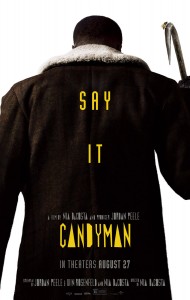CANDYMAN has a long history, both on and offscreen. Originally a short story by Clive Barker, “The Forbidden” was adapted into the 1992 movie CANDYMAN by writer/director Bernard Rose. Rose moved the story from Barker’s London to Chicago’s then-infamous Cabrini-Green low-income housing projects. Here, it was learned that Daniel Robitaille (played by Tony Todd), a Black man murdered in the 1800s by a white mob, had become the hook-handed spirit Candyman. Anyone who says his name five times into a mirror invokes a visitation and very bloody consequences.
The original CANDYMAN film had Candyman kidnapping a Black infant, who was rescued by white reporter Helen Lyle (Virginia Madsen) at the cost of her own life. Several sequels were made, but none were strongly tied into the events of the first movie.
However, 2021’s CANDYMAN, directed by Nia DaCosta and scripted by DaCosta and Jordan Peele and Win Rosenfeld, is a direct follow-up to the 1992 film. We are back in the now-gentrified Cabrini-Green, where we learn that Daniel Robitaille is not the last ghost of a murdered Black to embody the legend. The 2021 CANDYMAN is now out on Ultra 4K, Blu-ray, DVD and Digital from Universal
Vanessa Estelle Williams plays Anne-Marie McCoy in both the 1992 and 2021 CANDYMAN films. A New Yorker who got her big break in films in 1991’s NEW JACK CITY, Williams has subsequently had a career spanning movies, TV and stage. Some of her credits include MELROSE PLACE, MURDER ONE, MOTHER, CHICAGO HOPE, SOUL FOOD, THE FLASH, FAMOUS IN LOVE, THE BAY, and THE L WORD: GENERATION Q. Williams will soon be seen in the upcoming features SINGLEHOLIC and MID-CENTURY, and she has a recurring role on 9-1-1 as expert dispatch operator Claudette Collins.
In an exclusive phone interview, Williams discusses her work in the CANDYMAN films and on 9-1-1.
Spoiler warning for those who haven’t seen the current CANDYMAN: Williams’ character, Anne-Marie McCoy, is the mother of the kidnapped baby in the first film and, not coincidentally, the mother of the new CANDYMAN’s troubled artist hero Anthony, played by Yahya Abdul-Madeen II.
ASSIGNMENT X: When you did the first CANDYMAN, did you have any thought that Anne-Marie might recur later in some form?
VANESSA ESTELLE WILLIAMS: Absolutely no idea, no thought of it at all. [CANDYMAN] was my first gig that I got in L.A., and that made it seem like, “Oh, L.A. kind of likes me.” I was only here a couple of months, and I was riding the wave of NEW JACK CITY, and seeing what kind of work I could conjure up, because as a diehard New Yorker, I wasn’t so poised to just up and leave my hometown, my beautiful city. So, no, I had no idea whatsoever.
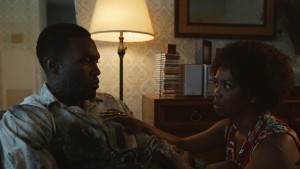
(from left) Anthony McCoy (Yahya Abdul-Mateen II) and Anne-Marie McCoy (Vanessa Williams) in Candyman, directed by Nia DaCosta.
AX: Do you see the new CANDYMAN as a deepening of the character? How has she changed over that time between the first film and this one?
WILLIAMS: Well, yeah, certainly, it’s a deepening of myself, having been not a mother when I was portraying one with a small baby, reaching for what I knew motherhood to be as an outsider, from having been mothered, and just being around babies. And now, to have a real, visceral experience, having had two sons [in real life], and all these years later, to revisit it, certainly the character deepened. Nia and I discussed that at length, around what her forward trajectory could have been – she now has a son who’s a successful artist, and what that means in terms of a parent who could have wished for her child to do something like a doctor, lawyer, or something like that, something more certain than to be an artist.
So, the kind of courage it took this woman, who’s a single parent, to raise this beautiful son after the trauma that they lived through, that the whole community lived through, and continues to live through with the other things that continue to go on, certainly her whole point of view has deepened, and who she is, and the very fact of holding a secret all these years, that she thought she’d never have to reveal, she’s living in a certain state of fear that something bad could happen to her child again. That’s a lot of stress for any person to live under, the kind of stress that Black people as a community live under. So, that’s all these layers that the movie speaks to, that certainly are embodied in Anne-Marie’s character.
AX: And how did you feel about the shift in emphasis between the first CANDYMAN and the second CANDYMAN? Because the first CANDYMAN wasn’t made from a Black point of view, whereas the new one is …
WILLIAMS: It was profound. The shift was a part of what made coming back so much more rewarding, to see who tells the story matters. It goes from being a story about victimized people, from people outside of that trauma and victimization, to a story being told by the people. So, it therefore becomes more authentic, it therefore becomes focused on all of the ways in which the violence and the terror that Black people live under is beyond the legacy of the boogeyman, of the Candyman, but also the violence, and the legacy of violence against Black people in general. That became a powerful and very important point to bring out and to draw out, because of who was telling the story, and how they chose to tell the story.
And then, in the year that we had, that the movie was supposed to come out [the original release was scheduled for 2020], that huge reckoning that we continue to move a little bit more forward from the history, and America tries to reckon with its original sin, and all the violence against African-Americans, and then for it to have to wait a whole other year before it comes out just shows just how powerful and important and still viable the themes of the movie are, because we’re still dealing with violence, and we’re still dealing with all the issues and systems that are in place to terrorize Black people.
I say to people that the horror of the movie is more, for me, the horror that you can’t shake off when you leave the theater, and go, “Okay, that was a movie, those people didn’t really die, that was a story.” The horror that lingers for me is that my sons and myself and people that I love who look like me are still threatened by the systems that are in place, and the horror that is violence against Black people.
AX: How much of this did you and Nia DaCosta discuss with each other, and how much did you come in understanding intuitively?
WILLIAMS: Both. I came in understanding from the way I read the script that was developed by Jordan Peele – it’s Jordan Peele and [his production company] Monkey Paw’s brand – so it was all there in the material. Besides getting a chance to work with him and his company, and work with Nia, as I found out that she’d be directing, it was just all the more enthralling, because it was already on the page. And so, when we met to speak about it and rehearse, it was just like, yeah, we’re all on the same page, we know what the job is, we know what we’re trying to do here, what this film is trying to do, and what Nia so successfully did with the input of all the actors. It’s a beautiful thing when a film comes together and it’s firing on all those cylinders. I just feel really proud and so pleased to have been a part, again, of such a monumental film, and a monumental offering to the society, and to the whole gamut of the industry.
AX: Between CANDYMAN 1992 and the new CANDYMAN, there were a few other CANDYMAN films. Had you paid attention to what was happening with the franchise in between, or were you just going on about your career?
WILLIAMS: I was mostly going on about my career. Of course, I was aware of [the franchise], not realizing or having any idea that my character would be revisited, because of the other films that came between the original and this new soulful sequel that had happened. I wasn’t sure that I would ever be participating again, because the story would change, as it did in those other sequels. But when I heard that Jordan Peele’s company was going to have something to do with it, I was like, “I’m hoping they need the mama back to strengthen the story.” [laughs] And so in fact, I was notified.
And it’s just so wonderful to get an offer as an actor, that the work you’ve already done has already proven that [you are qualified], that you’re not up for a job interview. My work as an actor is, I’m always on a job interview [laughs]. People who are not in the industry get the emotional stakes that are involved when you explain it to them that way, because they realize how taxing it is for them, when they’re on a job interview, and I was like, “Well, that’s the gig. You’re auditioning for a gig more than you have a gig.” So, it was so gratifying not to have to audition, and just be a part of the franchise already, and part of the story that they wanted to tell.
AX: Did you and Yahya Abdul-Madeen, playing Anne-Marie’s son, get to rehearse or discuss the relationship between your characters at all before you shot, or did you have to just go in and go?
WILLIAMS: I had to go in and go. [The CANDYMAN production team had been filming] in Chicago for a number of weeks before I got there, and Yahya was already all the way into that part of his character’s journey. So, he was already set. I came fully prepared, ready to jump in, because I knew, as I’ve guest-starred on shows, that there’s already a rhythm. So, there was not a whole lot of need for rehearsal.
When you’ve got an actor like Yahya, who’s just beaming and bubbling with emotion and presence from having lived and experienced the trajectory of the character already, we just got in there. And it was so divine and delicious, because my job as an actor is to react, and he was so full, it was ready to go. So, we were both ready to play, and I was so, so grateful for how it all turned out, so much so that Ian Cooper, who was the producer on set for Monkey Paw when we were there, wrote Yahya and I this amazing, flourishing letter about how much we moved him on the set, about how profound the scene was, and it was just like the cherry on top of an already delicious, wonderful cake, to come in and join the cast, to have such a marvelous moment, and then that your producers are so pleased and thankful for your work. And then later, when Ian told me about how he and Jordan watched [the 1992] CANDYMAN in their pajamas in Jordan’s room all those years ago, it was so funny and amazing. It was everything.
AX: You do a fair amount of work in genre film and television. Is horror/fantasy a genre you particularly like, or is this just where some of the work is?
WILLIAMS: It’s where the work is. I love to work, so it’s like, bring it all on [laughs]. I’m the kind of actor that trains for every kind of genre, I’m open and available to every kind of thing. It feeds me as a creative, it feeds me in terms of what my abilities are – that I can literally do it all. So, I’m pleased and so grateful when I have an opportunity to jump from one genre to the next, whether horror, comedy, drama – all of this involves and delights a different part of your creative muscle. So, I’m prepared and ready to do it all. It’s how the luck falls, and I’m not turning down the jobs, honestly.
AX: You also currently have a recurring role on the Fox drama 9-1-1 as Claudette Collins, who is a super-effective emergency dispatch operator …
WILLIAMS: Yeah. That was so amazing to book. Again, it was an offer [as opposed to an audition], thank you very much. I had done another horror genre for [9-1-1 executive producer/co-creator] Ryan Murphy’s company earlier, a few months before that, AMERICAN HORROR STORIES, which was a one-off, each week during the summer, those [short] horror films that they created. I played a therapist for Ba’al [in the episode “Ba’al”]. So, that was wonderful. And so, when they reached back out to me, to say, “Oh, there’s a character that we want you to do,” I don’t think I had gone in for it, but they knew my work from the times where I had auditioned before. And my agent called me to say, “Well, there’s a possibility – they’ve got a hold on you to replace an actor whose schedule isn’t working out.” And I was like, “I need to know today, because I’m on a plane tomorrow,” and they were able to get back to me. “Please stay, we want you to fill in.”
And so, I was literally working that week. It was all of this dispatch police jargon that got thrown at me, and I was just crazy with anxiety, trying to figure out, “Okay, how am I going to get all of this out of my mouth?” And somehow I was able to. They were really supportive about helping me win, in the way we shot and set it all up, because this character was not only a 9-1-1 dispatcher, but she was such a pro that everybody was looking to her, and crowding around [to watch] how she handles a call. She was a star dispatcher. So, I couldn’t go in there flubbing [laughs]. It was important that I be excellent. That was pretty daunting, because I had very little time to prepare for all of that.
AX: And what would you most like people to know about the new version of CANDYMAN?
WILLIAMS: They should absolutely watch it and be inspired by the new voice, and what the tone of it is, and how it’s handled. The new [home video format releases] have come out, and they should definitely take advantage of the extras, like the social impact piece, which is about a thirty-minute talk, hosted by Coleman Domingo [who has a costarring role in CANDYMAN]. They take apart the movie scene by scene, and how the genre has changed based on this film, and the way it was shot, and the social impact in terms of the horror, and the social impact that it has on the Black community in particular, and how the film dealt with all of those issues. It’s just really, really marvelous, from them pointing out the baby girl seeing her father jump out the window, and that calling back to African folklore about the people who could fly. It just enriches the experience to no end. It’s fun and scary – and I’m in it, so watch it [laughs].
Related: Movie Review: CANDYMAN
Follow us on Twitter at ASSIGNMENT X
Like us on Facebook at ASSIGNMENT X
Article Source: Assignment X
Article: CANDYMAN: Actress Vanessa Estelle Williams on 9-1-1 and the 1992 and 2021 CANDYMAN movies – Exclusive Interview
Related Posts:




